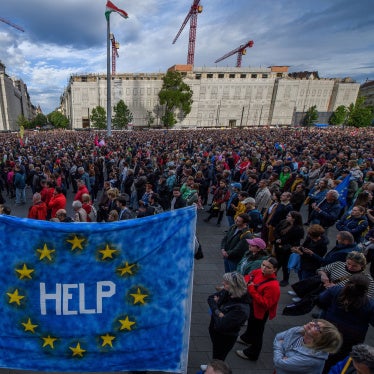The government of Yugoslav President Slobodan Milosevic has intensified its efforts to silence the political opposition in recent weeks.
The Serbian government is trying to destroy all forms of opposition," said Holly Cartner, executive director of the Europe and Central Asia division of Human Rights Watch. "It hasn't presented evidence to back up its charges against Otpor. This is a dangerous political game and the Serbian government should not be playing it."
The new tide of repression gained momentum with a May 17 police raid of Studio B television—a prominent opposition television station in Belgrade—and the closure of independent Radio B2-92 and Radio Index on the same day. On May 17-18, the police used excessive force to disperse street protests in Belgrade and beat protesters and passers-by for hours after the protests had been dispersed.
On May 16, Ivan Markovic, the Yugoslav minister of telecommunications, accused Otpor of several violent acts, including: planting bombs at the offices of the Yugoslav Left (JUL) and the Socialist Party of Serbia (SPS) in mid-April, attempting to murder a JUL member in Pozarevac on May 2, and assassinating Bosko Perosevic, head of the government of the Vojvodina province and chief of the provincial SPS branch, on May 13.
In recent weeks, hundreds of Otpor activists have been arrested and interrogated, but released without charge. To date, no Otpor member has been indicted on charges of "terrorism," as the cases are still under investigation. The Serbian authorities and the media under their control, however, have repeatedly accused Otpor of "terrorism." Most recently, two key activists were accused of involvement in the murder of a prominent politician in the town of Novi Sad, in a case which many independent observers believe is politically motivated.
Otpor is a loosely structured group that opposes the current government. It numbers an estimated 20,000 activists, most of whom are university students. Since the end of the NATO war (March-June 1999), it has carried out a series of symbolic street actions aimed at ridiculing the government of Yugoslav President Slobodan Milosevic. The movement has rapidly acquired sympathy among large sections of the population.
Since the beginning of 2000, the Serbian police have arrested and interrogated hundreds of Otpor activists without specifying the reasons for the arrests. In each case, those arrested were held only for a few hours before being released because there was no evidence that they had committed an offense. The frequent arrests have only increased the group's visibility, including in the traditional government strongholds, such as Pozarevac, the native town of President Milosevic and his wife Mirjana Markovic, located eighty kilometers southeast of Belgrade.
Details on the government's campaign are presented in a new Human Rights Watch "Press Backgrounder" entitled "Escalating Repression in Serbia: an Update on Harassment of the Otpor (Resistance) Movement."







